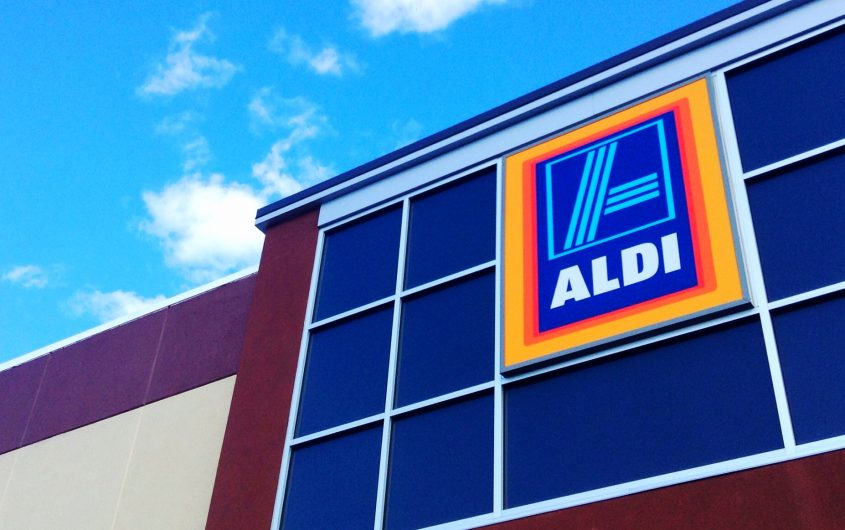
Mike Mozart via Flickr
The Albrecht Brothers and the Rise of a Global Retail Behemoth

Emma Sauder
Research Intern
Emma Sauder is a research intern for the fall of 2020. She monitors various news outlets for media relevant to AICGS’ mission, supports research with fellows, writes articles for the AICGS site, and assists with the Institute’s social media.
Currently, Emma is pursuing a double degree from the George Washington University in History and International Affairs with a concentration in Europe and Eurasia and a minor in German. Her interests include German history, the continued growth of transatlantic relations, the expansion of the AfD, and what this means for the future of German politics.
Prior to AICGS, Emma has studied German for the past seven years and hopes to study abroad in Germany this spring if conditions allow it.
Few supermarket chains are as ubiquitous or as popular as Aldi with 2,031 stores in the United States and over 11,000 stores worldwide. The store’s founders, the brothers Karl and Theo Albrecht were estimated to be worth a total of 38.8 billion dollars in 2014. However, despite this fortune, this global grocery store had very humble beginnings.
Aldi was first founded in 1913 by Anna Albrecht as a small grocery store in Essen. Her sons, Karl and Theo Albrecht took over ownership of the store in 1948. They came up with the idea of the first-ever known discount store by selling items at the subtraction of the legal maximum 3 percent rebate rate. They also started selling non-perishable goods, which were in high demand in postwar Germany and cheap to sell. By 1950, the brothers had expanded the company and owned thirteen stores in Ruhr valley. They also started going by the name of “Albrecht Diskont.”
In 1960, the brothers split the company in half due to an argument over whether or not they should start selling cigarettes. Karl believed it would attract shoplifters, while Theo believed it would just attract more customers. This split led to Theo owning all stores in North Germany (Aldi Nord) and Karl owning all stores in the south (Aldi Süd). The name officially became Aldi in 1962 by shortening Albrecht Diskont to Aldi. Both chains continued to grow in popularity, and Aldi Süd started opening stores in the United States in 1976 and currently owns all U.S. Aldi-branded stores. Meanwhile, Aldi Nord expanded to the states by purchasing the grocery store chain known as Trader Joe’s in 1979. In 2019, the ALDI company had a total of 4,146 stores in Germany with 2,212 as Aldi Nord and the remaining 1,934 owned by Aldi Süd. In 2018, it was estimated that the company made over 80 billion dollars in revenue.
The fame and wealth surrounding the two brothers did not always attract positive attention. Theo Albrecht was held at gunpoint and kidnapped for ransom in 1971. Theo was kept captive for seventeen days in a wardrobe in Dusseldorf and finally released after his ransom of seven million Deutschmarks (two million U.S. dollars). Interestingly, it was rumored that Theo even haggled with the kidnappers to try and lower the ransom. Theo also unsuccessfully attempted to get the ransom as a tax write-off with the argument that it was technically a business deal.
The kidnappers, Paul Chron and Heinz Ollenburg, were both arrested shortly after due to people recognizing their voice being played on the radio. The men were both sentenced to eight and a half years in prison and kept low profiles thereafter. The ransom money was never fully recovered due to a disconnect between the two kidnappers. Kron claimed that Ollenburg only gave him several thousand Deutschmarks, while Ollenburg claimed they split it evenly. To this day, 3.5 million Deutschmarks are still missing and rumored to be hidden in Switzerland. It is likely the money will never be found as both kidnappers passed away in 2017.
After the release, Theo was emotionally traumatized and became very withdrawn from public appearances. He went to great lengths to avoid having his picture taken, started driving an armored car, and took a different path to work every day. Karl also became more withdrawn. Both brothers rarely appeared in public and even turned down a number of awards and forms of recognition that organizations offered them, including a street in Essen to be named after Aldi.
In 2010, Theo Albrecht passed away at 88 in Germany with a net worth of 16.7 billion dollars. Four years later, Karl soon followed at the age of 95 and with a net worth of 25.9 billion dollars. With the death of Cäcilie Albrecht, the wife of Theo, in 2018, drama has arisen among the heirs of the Aldi fortune. Her will cut out her late son’s widow, Babette Albrecht, and their adult children from having a role in the company. This is due to the late Cäcilie’s fears that Babette and the children will lead the company to ruin and not properly use the money gained. This is not the first-time controversy has surround Babette Albrecht as when her husband, Bertoldt Albrecht, died in 2010, his will also tried but failed to keep her and their children out of the company. The case and outcome of Cäcilie’s will were not publicly evaluated due to privacy concerns.
Both Aldi Nord and Aldi Süd continue to be popular chains around the world. Aldi Süd is estimated to become the third highest-grossing grocery store in the United States by the end of 2022. Aldi Nord/Trader Joe’s in the U.S. is following close behind as it is considered to be the fourth most popular grocery store. Aldi’s business model—low prices, limited options, high quality, no frills—has resonated over the decades and in a variety of cultural contexts, ranging from Poland to Portugal; Australia to China. Both brothers have left an enormous legacy with the broad spreading of discount stores, all thanks to Essen’s little corner store and the entrepreneurial vision of two brothers.









